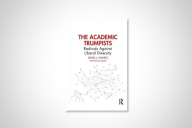You have /5 articles left.
Sign up for a free account or log in.

Wikimedia Commons
Higher education is the great equalizer. Correction: a bachelor’s degree is the great equalizer. Graduate and professional degrees? Not so much, according to a forthcoming study in Social Science Research that seeks to explain why intergenerational mobility is high for college graduates but lower among advanced degree holders.
For their study, the authors examined the relationship between parents’ education and children’s earnings using 2010, 2013, 2015 and 2017 National Survey of College Graduates data. They ultimately found that children from families with high socioeconomic status obtain relatively expensive and financially rewarding advanced degrees, attend more selective institutions and graduate at a younger age than their less advantaged counterparts. All of that enhances earning potential.
First, a disclaimer: this study and others like it should not be interpreted to mean that advanced degrees hurt those from lower socioeconomic backgrounds. Advanced degrees will, most likely, still make a profound difference, financially and otherwise, in the lives of those who come from economically challenged families.
Instead, these mobility studies mean that bachelor’s degrees effectively erase intergenerational socioeconomic association -- and that an association between one’s family of origin and one’s own socioeconomic status re-emerges when looking at graduate and professional degree attainment.
As lead author Byeongdon Oh, a Ph.D. candidate in sociology at the University of Kansas, said last week, “Advanced degrees are worth it for many reasons.” But among graduate degree holders, “those who came from upper-class families are doing better in labor markets than those who came from lower-class families. Your advanced degree is not good enough to nullify your family background.”
That includes all advanced degree types, with one exception, he said: the master’s in business administration. Oh said he and senior author ChangHwan Kim, professor of sociology at Kansas, believe that this is because many M.B.A.s have work experience before getting their degrees. Their studies are also often supported by their employers. So family influence is minimal.
Oh said that his study challenged the undergraduate-degree-as-great-equalizer consensus, as well, in that it has something to do with field of study. That is, students from higher socioeconomic backgrounds are more likely to choose less financially rewarding undergraduate majors, such as those in the humanities, but they are more likely to advance to graduate school and obtain financially lucrative degrees.
A major 2011 paper challenged the higher-education-as-equalizer argument by splitting degrees into B.A. only and graduate. It found that intergenerational association declined up to the baccalaureate level but re-emerged thereafter, making a U-shaped pattern across children’s degree attainment. That same paper attributed the U-shape to occupational allocation being strongly patterned by family origin and inequality in labor markets, but didn’t test them with advanced statistical models.
The Right Side of the U-Curve
The new paper seeks to dig deeper to explain what the authors call the “right side of the U-curve.” Its broad premise is that parents and children adopt educational strategies according to social background because of finances, cultural preferences or both. In short, it’s about risk -- and who can afford it.
“We assume that given these differentiations, upper-background children are more likely to choose longer-term, more ambitious, and more academically-focused courses,” Oh and Kim wrote, “whereas lower-background children are more sensitive to their chances of success in the labor market, and thus they are more likely to develop educational strategies that avert the risk associated with educational investment.”
Oh and Kim chose the Census Bureau's survey of college graduates as their data set because of its large sample size. They limited their own sample to positive earners between ages 35 and 54 and still came up with 54,567 men and 45,056 women. Of those, 23,327 men and 23,338 women had an advanced degree.
Through a series of advanced analyses, they examined intergenerational “inheritance” using the association between parents’ education and children’s earnings. Among advanced degree holders, for each one-year increase in parents’ schooling, earnings rose by 2.3 percent for men and 1.2 percent for women. Moreover, all of that could be explained by the following: “vertical selection,” meaning that children of highly educated parents tended to earn expensive and financially rewarding advanced degrees; “horizontal selection,” meaning they pursued “hyper-lucrative” postbaccalaureate fields of study, such as law or medicine, while attending selective institutions; and they completed their education at a younger age and enjoyed earnings growth over more years.
As Oh noted, children of highly educated parents were also more likely to choose a liberal arts major and less likely to choose a business a major as undergraduates.
“High-SES families have a greater financial and cultural capacity to support their children’s graduate education,” the paper states. So the findings “cast doubt on the notion that expansion of higher education can boost equal opportunity regardless of family background.” More precisely, as higher education becomes more complex and costlier, “parents and children adjust their educational choice strategies taking into account the available financial and cultural resources and perceived opportunity costs. Upper-background families find a way to exploit the potential of this institutional differentiation to their favor.”
Florencia Torche, a professor of sociology at Stanford University who wrote the 2011 paper on which Oh and Kim built, said the new paper replicates her own findings and demonstrates that people from lower socioeconomic backgrounds also take longer to get advanced degrees. And so they have less time to “cash out” on the benefits -- probably, she said, because they’re working before or during their studies.
Torche also cautioned that the paper is not a referendum on whether advanced degrees are “worth it.” But it could help spur important policy discussions, she said, such as whether socioeconomically disadvantaged people who perceive it’s “too risky” to pursue financially lucrative but expensive degrees, such as those in medicine, may need assistance beyond basic loans.
“We are talking about some degrees that incur $250,000 in debt,” she said. “If we want to achieve mobility at that level, maybe we need more strategies for people to achieve them that seem feasible.”









